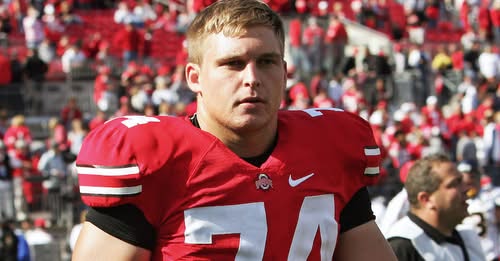Former Ohio State offensive lineman Kirk Barton has been formally charged with aggravated vehicular manslaughter following a deadly car crash that occurred in Dublin, Ohio.
Former Ohio State offensive lineman Kirk Barton, once a standout on the Buckeyes’ offensive front and a name familiar to many fans of college football, is now facing serious legal consequences following a tragic incident that has shocked the Ohio sports community. Barton has been charged with aggravated vehicular manslaughter after his involvement in a fatal car accident that took place in Dublin, Ohio. This development has cast a heavy shadow over a figure who once represented discipline and toughness on the gridiron but is now at the center of a case with deeply human and legal consequences.
The accident reportedly occurred late at night on a quiet stretch of roadway in Dublin, a suburban community just northwest of Columbus. Details from law enforcement indicate that Barton was driving at a high rate of speed when he lost control of his vehicle. The resulting crash led to the death of another individual, whose identity has been confirmed by local authorities but is being withheld from public release until next of kin were notified. The nature of the crash and the surrounding circumstances quickly prompted an investigation, and officials determined there was sufficient evidence to file formal charges against Barton, citing both the manner and speed of his driving as contributing factors.
Aggravated vehicular manslaughter is a serious felony under Ohio law. It typically applies when a person causes the death of another through reckless operation of a vehicle, often involving alcohol, drugs, or excessive speed. In Barton’s case, investigators have not publicly confirmed whether any substances were involved, but the charge alone implies that the act was not merely an accident but met the threshold of recklessness. The weight of the charge signifies that prosecutors believe Barton exhibited behavior that rose well above negligence and into the territory of criminal irresponsibility.
Barton, who played for Ohio State from 2003 to 2007 and later had a brief career in the NFL, has long been known for his physical prowess and football IQ. He served as a captain during his senior season and was a key figure on teams that made deep runs in the postseason, including a trip to the national championship game. After his playing days ended, Barton remained connected to the Ohio State program through media, coaching, and recruiting analysis, building a reputation as someone who knew the Buckeye system inside and out. His voice was often heard breaking down film, offering insights into offensive line play, and supporting the current generation of players.
That legacy has now been interrupted in devastating fashion. The charges have drawn both local and national attention, not only because of Barton’s association with a storied college football program but also because of the broader implications for accountability, safety, and personal responsibility. The court of public opinion has already begun to weigh in, as is often the case when public figures face criminal charges. While many express sadness for the loss of life and the situation as a whole, there’s also a sense of disappointment that someone once looked up to by so many could find himself in such a tragic scenario.
In the days following the crash, a range of reactions emerged across Ohio State circles. Former teammates expressed shock and sorrow, with some pointing out that Barton had always been an intense personality, someone who threw himself fully into whatever role he took on, whether that was blocking defensive linemen or breaking down game tape. Others who had followed his post-football career noted that Barton had remained deeply involved in Ohio State’s football community, making this all the more jarring. Fans and alumni, many of whom remembered Barton’s contributions to successful Buckeye squads, have struggled to reconcile the player they cheered for with the man now facing a serious felony charge.
The family of the victim is at the center of this tragedy, enduring unimaginable pain. Community members in Dublin have organized to support them, with online fundraisers and vigils being planned to honor the life that was lost. Legal experts suggest that the case could move quickly depending on whether Barton intends to contest the charges or reach some kind of plea agreement. The severity of the charge carries the possibility of a lengthy prison sentence if he is convicted or pleads guilty. Ohio law treats aggravated vehicular manslaughter with the utmost seriousness, particularly when it involves high-speed driving or intoxication.
As the legal process unfolds, attention has turned to the broader themes surrounding the incident. There are renewed calls for greater awareness about responsible driving, especially among young adults and former athletes who may still feel invincible years after their playing days are over. Local law enforcement officials have emphasized that no one is above the law, regardless of past fame or athletic accomplishment. In their statements to the media, they have been measured but firm, noting that the process will be thorough and fair but also appropriately stringent in holding accountable those whose actions result in loss of life.
Barton’s legal team has not issued a detailed statement beyond acknowledging the charges. Legal analysts anticipate a series of motions and hearings over the coming weeks, as both sides prepare for what could be a contentious trial unless an agreement is reached. Barton is presumed innocent until proven guilty, as is standard in the American legal system, but the charges against him are undeniably serious and will require a vigorous defense if he hopes to avoid a long prison term.
In terms of personal impact, Barton’s own life has been irreversibly altered. From the public stage of Ohio Stadium to a courtroom where his every word will be scrutinized, the transition could not be starker. The fall from grace is a narrative as old as sports itself, but each case still cuts deeply when it involves real people, real consequences, and real loss. Barton, who once drew attention for pancake blocks and leadership in the huddle, is now drawing attention for a tragedy that may define his legacy in the public eye far more than any athletic feat.
The ripple effects extend beyond the individual. Ohio State’s football community, while not directly implicated, finds itself revisiting uncomfortable questions about the post-collegiate lives of its former players. The program has, in recent years, made a concerted effort to support athletes in their transitions to life beyond football, offering resources for mental health, career counseling, and personal development. Yet stories like this one remind everyone that those efforts, while noble, may not always be enough. The burden ultimately falls on individuals to make decisions that align with personal accountability and public safety.
In Dublin and the surrounding areas, where the crash occurred, the mood is somber. Residents have spoken of their concerns about traffic safety and speeding in suburban neighborhoods, an issue that has long been on the radar for local officials. The crash has reignited those concerns, with some residents calling for increased enforcement and better traffic-calming measures to prevent similar tragedies. It is a grim irony that it often takes the death of a community member to bring renewed attention to long-standing safety issues, but that is now part of the reality Dublin must confront.
Meanwhile, for those who knew Barton personally, the situation is both heartbreaking and baffling. Many have expressed a desire for the full truth to emerge in court, not only to understand what happened but to see justice served. There are those who hope that Barton, whatever the outcome of his case, will take responsibility and work to educate others about the dangers of reckless driving. Whether he chooses that path remains to be seen, but the opportunity for redemption — though distant — still exists, as it often does in the American justice system when accompanied by genuine remorse and a willingness to make amends.
Still, none of that can undo the damage already done. A life has been lost. A community is grieving. And a former football star now faces the possibility of spending years behind bars. It is a story without winners, only a cascade of consequences that began with one decision on one night and ended with irreversible tragedy. Kirk Barton, once known for his strength on the field, must now summon a very different kind of strength — the strength to face what lies ahead, to confront the pain he has caused, and to reckon with the path that brought him to this point.



